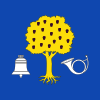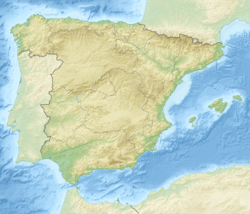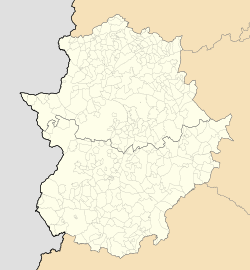Navalmoral de la Mata facts for kids
Quick facts for kids
Navalmoral de la Mata
|
|||
|---|---|---|---|
|
|||
| Country | Spain | ||
| Autonomous community | Extremadura | ||
| Province | Cáceres | ||
| Area | |||
| • Total | 155.96 km2 (60.22 sq mi) | ||
| Elevation | 291 m (955 ft) | ||
| Population
(2018)
|
|||
| • Total | 17,170 | ||
| • Density | 110.09/km2 (285.14/sq mi) | ||
| Time zone | UTC+1 (CET) | ||
Navalmoral de la Mata (Spanish: [naβalmoˈɾal ðe la ˈmata]) is a town in Spain. It is located in the province of Cáceres, which is part of the Extremadura region. This town sits between the Tagus and Tiétar rivers. In 2016, about 17,247 people lived there.
Contents
A Look Back in Time
Navalmoral de la Mata has a long history. People lived here even in prehistoric times. There are also remains from the ancient Roman age. These include old villas, bridges, and temples.
The town of Navalmoral was founded a long time ago. This happened in the late 1300s or early 1400s. It was created as an important place for travel and communication. Later, in the 1800s, it became its own independent town.
Building Roads and Progress
During the time of Miguel Primo de Rivera, new roads and bridges were built. This helped the town connect better with other places. At first, local farmers supported these changes. But they later stopped supporting the government. This was because the government did not keep all its promises.
In 1931, people voted in local elections. Most people voted for candidates who wanted a new type of government. This led to the start of the Second Spanish Republic. Roads like La Vera and Guadalupe were built during this time.
Economic Growth and Changes
In 1930, a Tobacco Fermentation Center was started. This helped the economy of Navalmoral grow a lot. It created many jobs and boosted local businesses.
Later, in 1933, some local people took part in a protest. This protest was part of a larger movement happening across the country.
During the Spanish Civil War
On July 21, 1936, the Spanish Civil War began. Soon after, Navalmoral was taken over by rebel forces. This happened after a quick fight.
Modern Developments
Starting in 1949, the Rosarito's Irrigation Plan began. This project greatly helped Navalmoral's economy and population. It allowed farmers to grow more cotton and tobacco. This led to new local industries.
Another big project was building the Valdecañas Reservoir. This helped use the Tagus river for resources. It brought new money to Navalmoral and the surrounding area. This also helped stop the population from shrinking in the 1960s. Because of these changes, new neighborhoods and schools were built. The town also got better running water and sewer systems.
In 1972, work started on the Almaraz Nuclear Power Plant. This project brought even more people and money to Navalmoral. Even though some people in the town were against it, it helped the economy grow again.
Recent Leadership
After the local elections in 1979, Tomás Yuste Mirón became the mayor. Many public works continued, helping Navalmoral become a main town in its region. In 2015, Raquel Medina became the new mayor of the town.
Fun Things to Do
The main festival in Navalmoral de la Mata is its annual carnival. This big celebration happens every early spring. For five days, there are three large parades that people enjoy.
Navalmoral de la Mata is becoming a major center for business. It will be the home of "Expacio-Navalmoral." This is a large industrial area. It will help process, supply, and deliver materials and goods to big cities like Madrid.
- Rafael Cerro (born 1993) is a Spanish bullfighter. He was born in Navalmoral de la Mata.
See also
 In Spanish: Navalmoral de la Mata para niños
In Spanish: Navalmoral de la Mata para niños
 | William Lucy |
 | Charles Hayes |
 | Cleveland Robinson |





